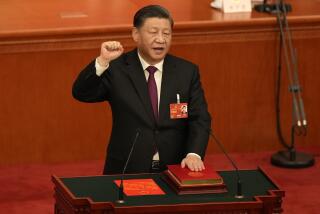Chinese Premier’s Swan Song Calls for Continued Growth
- Share via
BEIJING — In his final report as head of China’s government, Premier Zhu Rongji called for continued high economic growth and bureaucratic streamlining while warning of the widening gap between rich and poor.
Speaking to the annual session of China’s legislature, Zhu outlined his accomplishments that made China the world’s top recipient of foreign investment, the sixth-largest economy and the fifth-largest exporter while millions of Chinese were pulled out of poverty.
Zhu set a target of a 7% increase in gross domestic product this year, just under last year’s 8% growth, the fastest among the world’s major economies.
“We should continue to take developing agriculture and the rural economy and increasing farmers’ income as the top priority of our economic work,” Zhu told the 3,000 delegates.
Failure to address rural poverty, he cautioned, could “severely dampen farmers’ enthusiasm, rock the foundations of agriculture and even threaten the entire national economy.”
He made clear that Beijing’s spending spree on waterworks, roads and airports, funded by domestic treasury bonds, would continue this year.
The legislature is due to ratify a new generation of Communist Party leaders as heads of state and government, finalizing decisions made at the 16th Party Congress in November.
Zhu also referred to the legislature’s expected approval of a government reorganization plan that state media have reported will consolidate half the government’s 29 ministries over the next 15 years.
Zhu is the first of China’s five premiers to voluntarily retire. In recent days, his legacy has been hotly debated.
“We’re now in the post-reform era,” said Laurence Brahm, a Beijing-based lawyer and author of the book “Zhu Rongji and the Transformation of Modern China.” “Some of the reforms initiated by Zhu over the last five years are not finished, but they’re so advanced that they’re absolutely irreversible.”
Zhu clinched China’s World Trade Organization entry and set in motion the dismantling of the “iron rice bowl” social welfare system. He presided over the doubling of government fiscal revenue, exports and foreign exchange reserves.
He helped trim 1.5 million jobs from the bureaucracy, approved prosecution of the biggest smuggling racket of the communist era and oversaw the military’s divestiture of business interests.
Yet income disparities have become the most severe since the communist revolution. Zhu’s tax reforms have swelled state coffers but left local governments deep in debt and hard pressed to provide basic services.
“There is a sense of disappointment about Zhu. People expected him to be a leader, not just a manager,” said Maochun Yu, a historian at the U.S. Naval Academy in Annapolis, Md. “Ultimately, he is a conventional figure, a charismatic leader who, even though he cared about people at the bottom, stuck to his ways of trying to change things from the top down.”
Zhu’s policies are likely to be continued by his expected successor, Vice Premier Wen Jiabao, who has gradually been assuming key elements of Zhu’s portfolio in recent years.
Under the Chinese Constitution, Zhu, 74, is eligible to serve a second five-year term, but in a clear attempt to set an example for other officials, he not only decided to step down, but has long insisted that after retirement he would retain no official posts.
The Communist Party has also been trying to end the country’s gerontocracy by insisting on the retirement of leaders older than 70.
More to Read
Sign up for Essential California
The most important California stories and recommendations in your inbox every morning.
You may occasionally receive promotional content from the Los Angeles Times.













